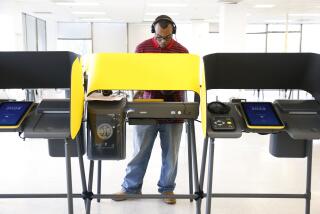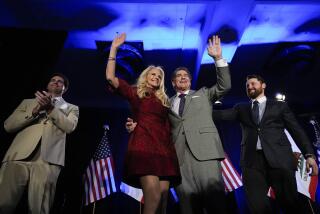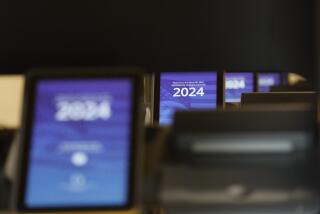Making California relevant to presidential campaigns
When Republican Mitt Romney kicked off his presidential campaign Monday, he did it using a New Hampshire football field as the backdrop.
Not a football field in neighboring Massachusetts where he once was governor. And certainly not at the Rose Bowl, here in the most populous state, where the grand prize is the nation’s biggest bloc of electoral votes.
No, it was in pipsqueak New Hampshire, one of the nation’s least populous states. That’s because spoiled New Hampshire always is allowed to hold the nation’s first presidential primary.
Similarly, any political noise in Iowa — such as a daffy straw poll — gets the hordes’ attention because the middling-size state is permitted to hold the nation’s first caucuses.
You don’t hear about any sort of straw poll in California.
OK, get over it! We’re in the backwater and ignored in the presidential nominating contests, except as an ATM where candidates can beg for money from very rich political investors.
We’ve tried moving up our primary into winter, but the little states still leapfrog over us. So be it.
Problem is, recently we’ve been snubbed even more in the November general elections. And that’s something California can remedy, in concert with other disrespected states.
The culprit is the anachronistic electoral college, a relic that needs to be circumvented and rendered moot.
To begin with, the term electoral college isn’t even mentioned in the Constitution. The Founding Fathers merely decreed that the president would be chosen by state “electors.” The legislatures could appoint the electors any way they wanted.
Each state was allocated electoral votes based on its number of U.S. House members — determined by population — plus two senators. California currently has 55 electoral votes, 20% of the total needed to elect a president.
Almost every state awards all its electoral votes to the candidate who wins the state’s popular vote. (Nebraska and Maine don’t.) This winner-take-all system has a sordid history, evolving as states — especially slave states — jockeyed for power leading up to the Civil War.
Winner-take-all has at least two drawbacks.
One, it’s possible for a candidate to win the popular vote and still lose in the electoral college. That has happened four times, the most recent in 2000 when nearly 544,000 more people voted for Al Gore than for George W. Bush.
If America ever needed proof that the candidate who receives the most popular votes nationwide should win the presidency, the Bush administration provided it. But let’s not go into that here.
The second drawback has victimized California in every recent election: We’re shunted to the sidelines, relegated to the role of spectators in the nosebleed seats, peering from afar as the candidates compete in a few “battleground” states.
California may have a gargantuan bloc of electoral votes, but they’re assumed to be already in the pocket of the Democrat, who takes us for granted. The Republican considers us a hopeless cause not worth fighting for. There’s no campaigning, organizing or money spent by either candidate.
But there’s a solution: The Assembly Democratic and Republican caucus chairmen — Jerry Hill (D-San Mateo) and Brian Nestande (R-Palm Desert) — have teamed up with bipartisan legislation that would make California relevant again in presidential politics. The measure cleared its first committee Tuesday.
Under the bill, California would sign an interstate compact obligating each signatory state to cast all its electoral votes for the presidential candidate who wins the national popular vote. The compact wouldn’t go into effect unless signed by enough states to comprise a majority of the electoral college vote.
So the concept of electoral votes would be retained; no constitutional amendment required. But the states would ensure that the candidate preferred by most American voters would be elected president.
Every vote would be worth fighting for — whether in California, Colorado or the Carolinas.
To date, six states plus Washington, D.C., have signed up, representing 27% of the electoral majority.
Former Gov. Arnold Schwarzenegger vetoed similar bills twice. Once, he complained that all of the state’s electoral votes could be awarded to a candidate most Californians didn’t vote for. He missed the point.
To accept the national vote concept, people have to get past the notion that states should elect presidents. They need to believe that individual voters have the right to elect their president directly.
But Schwarzenegger probably didn’t think much about the issue. It’s likely he was merely obliging Republican legislators who solidly opposed the bill. Many later admitted that they had been defensive about Bush’s disputed victory.
One such Republican is former Assemblyman Ray Haynes of Murrieta. “I thought it was a proposal to redo Bush v. Gore,” he says. “That was my visceral reaction.”
Haynes later became a strong supporter of the national popular vote idea. “It would make everyone in the nation an actual participant in a national election,” he says.
Former state Senate Republican leader Jim Brulte of Rancho Cucamonga also is a staunch advocate. It would force candidates to visit the state and learn about our problems, he says.
“It would be good for California,” he says. “And Lord knows, California needs all the help it can get.”
It needs candidates to ask us for our votes, not just our money.
More to Read
Start your day right
Sign up for Essential California for news, features and recommendations from the L.A. Times and beyond in your inbox six days a week.
You may occasionally receive promotional content from the Los Angeles Times.






